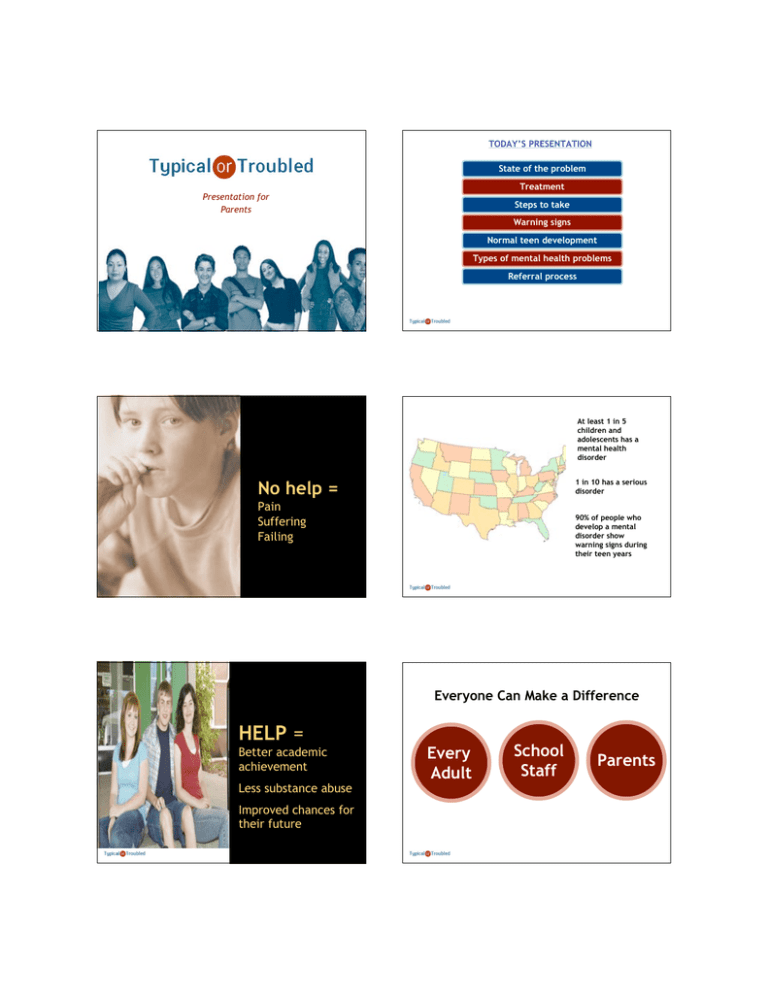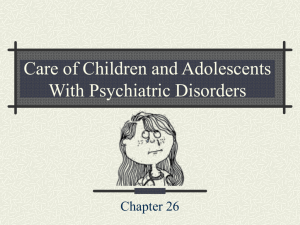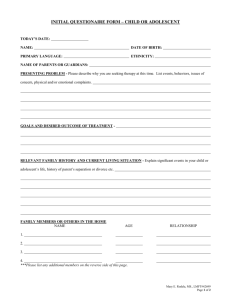Document 13341631
advertisement

TODAY’S PRESENTATION State of the problem Improving Teen Mental Health Treatment Presentation for Parents Steps to take Warning signs Normal teen development Types of mental health problems Referral process At least 1 in 5 children and adolescents has a mental health disorder No help = 1 in 10 has a serious disorder Pain Suffering Failing 90% of people who develop a mental disorder show warning signs during their teen years Everyone Can Make a Difference HELP = Better academic achievement Less substance abuse Improved chances for their future Every Adult School Staff Parents Steps Parents Can Take Parents’ Critical Role NOTICE TALK ACT Angry or aggressive behaviors Poor concentration Increased tardiness or absences Withdrawn Withdrawn Anxious •Complex period of rapid change, transition •Challenges: fitting in, defining identity, competing demands (school, home) Troubled? Typical? Typical Adolescents • Sometimes - other home issues (divorce, violence or substance abuse) Bottom line: May display alterations of mood, distressing thoughts, anxiety, and impulsive behavior. • Experiencing more than normal developmental challenges • Without treatment, more likely to have serious problems: • Academic • Relationships • Employment Signs of Trouble What causes mental health disorders? biology + environment Adolescent Mental Health Disorders As you NOTICE signs, ask yourself, are they: • FREQUENT ? – (e.g., adolescent is quiet, withdrawn over multiple days/weeks) • EXTREME ? – (e.g., violent outburst) If either: • TALK with the adolescent • ACT by communicating what you’ve to school staff or an outside provider CLINICAL DEPRESSION Mood disorders Anxiety disorders Psychotic disorders Behavioral/disruptive disorders ANXIETY DISORDERS •Deep despair, sadness, crying •Overwhelming fear with no cause •1 in 13 adolescents experience symptoms •Frequently runs in families BIPOLAR DISORDER EATING DISORDERS •Extreme changes from happy to sad •Unrealistic thoughts about weight •1 in 100 adolescents have it •1 in 20 adolescents suffer; 90% females •Hard to diagnose, looks like depression SCHIZOPHRENIA •Can result in death OPPOSITIONAL DEFIANT DISORDER •Strange thoughts, unusual behaviors •Stubborn, argumentative, hostile •High functioning, then big decline •Major distraction in the classroom or problems in the community •Distrustful, no longer social, voices ADHD •Problems paying attention •Can seriously impact ability to learn CONDUCT DISORDER •Verbal/physical aggression •End up in juvenile hall Adolescents use & abuse of alcohol and drugs can be common. Why? Adolescent Mental Health & Substance Abuse • Curiosity, feels good, reduce stress, fit in, feel grown up •Some use drugs/alcohol to compensate for anxiety, depression, lack of positive social skills Some facts: Adolescent mental health & substance use: Warning Signs of teen drug/alcohol abuse • Mental health disorders often co-exist with substance abuse problems Emotional: • Repeated & regular recreational use can sometimes lead to anxiety and depression • Teen risk factors for developing serious alcohol/drug problems: depressed, low selfesteem, feel out of mainstream, family history of substance abuse, lack of positive social skills Warning Signs (cont’d) • • • • • • Personality change, mood changes Irritable, negative attitude Depression Irresponsible or delinquent behavior Drop in school performance Change in groups of friends Depression Abuse of alcohol/ drugs Physical complaints Self-injury Physical: • Fatigue • Repeated health complaints • Red/glazed eyes, lasting cough • Changes in eating or sleeping habits Intense fear of becoming Frequent obese outbursts Marked change in school performance Unusual behavior Threats to run away Aggression Nightmares Threat to harm self or others Sexual acting out Inability to cope EFFECTIVE TREATMENT Psychiatrists Psychologists Therapy, Medication – Sometimes combination works best No “silver bullet” or quick fix – timeframe depends on: Mental Health Counselors MEDICATION – Severity of disorder – Temperament of child – Family & school support Effective Mental Health Treatment THERAPY • Used to: – Improve daily functioning – Prevent serious symptoms – Enable therapy to be more effective • Must be used appropriately and only under care of psychiatrist or other physician Effective Treatment for Mental Health and Substance Use Cognitive Behavior Therapy (CBT) Family Therapy Group Therapy PROCESS IN A SCHOOL TEACHER identifies a cause for concern in a student TEACHER talks to student TEACHER notifies SCHOOL COUNSELOR assigned to student (or CASE MANAGER for special ed students) • Adolescent psychiatrist consultation to help with assessing for co-existing mental health diagnoses and treatment decisions STUDENT and SCHOOL COUNSELOR meet SCHOOL SOCIAL WORKER or PSYCHOLOGIST or other is engaged if needed • Types of treatment might include inpatient, outpatient programs, support groups, twelve-step programs SCHOOL COUNSELOR handles problem OR If problem is identified as a behavior/conduct problem, student is sent to ASSISTANT PRINCIPAL SCHOOL COUNSELOR provides information on outside resources PSYCHOLOGIST PSYCHIATRIST SOCIAL WORKER MH COUNSELOR External Referral Process NOTICE TALK ACT More Resources for You • www.healthyminds.org – (American Psychiatric Association) Changing a Life’s Course • Other Resources – www.aacap.org (American Academy of Child and Adolescent Psychiatry)






